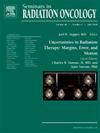Debate 3: Metastasis Directed Therapy in Oligometastatic Prostate Cancer
IF 3.2
3区 医学
Q3 ONCOLOGY
引用次数: 0
Abstract
Oligometastatic prostate cancer (OMPC), characterized by limited metastatic burden (≤5 lesions), encompasses 3 major subtypes: de novo synchronous oligometastatic hormone-sensitive prostate cancer (om-HSPC), metachronous oligorecurrent HSPC (or-HSPC), and oligoprogressive castrate-resistant prostate cancer (op-CRPC). Metastasis-directed therapy (MDT), particularly stereotactic body radiotherapy (SBRT), has been widely adopted and offers a noninvasive approach for delaying disease progression and achieving durable local control while maintaining the quality of life (QoL). This review examines the evolving evidence supporting MDT across OMPC spectrum. In de novo om-HSPC, early prospective studies suggest benefit when combining MDT with systemic therapy and local prostate radiation therapy (RT). However, conclusive randomized evidence for benefit of MDT in de-novo om-HSPC is lacking. For or-HSPC, randomized trials (STOMP, ORIOLE) demonstrate that SBRT-MDT safely delays systemic therapy initiation and prolongs progression-free survival (PFS). In nodal or-HSPC, the PEACE V-STORM trial has shown superior biochemical and locoregional control with elective nodal radiotherapy (ENRT) compared to SBRT alone. For well selected patients with OMPC, systemically augmented MDT (SBRT with short-course ADT±ARPI) is an attractive strategy to improve outcomes with no added QoL detriment and has shown more durable responses than either modality alone (EXTEND, RADIOSA trials). The recent WOLVERINE meta-analysis has shown that MDT improves PFS and overall survival across OMPC subtypes. Patient selection remains crucial, with PSA kinetics, PSMA-PET findings, and genomic factors emerging as potential biomarkers for personalizing the OMPC therapeutic landscape. While several phase III trials are ongoing, current evidence supports MDT integration into clinical practice for appropriately selected OMPC patients.
争论3:转移性前列腺癌的定向治疗
寡转移性前列腺癌(OMPC)以转移负担有限(≤5个病灶)为特征,包括3个主要亚型:新生同步寡转移性激素敏感前列腺癌(om-HSPC)、异时性寡复发性前列腺癌(or-HSPC)和寡进行性去势抵抗性前列腺癌(op-CRPC)。转移定向治疗(MDT),特别是立体定向体放疗(SBRT),已被广泛采用,并提供了一种非侵入性的方法来延缓疾病进展和实现持久的局部控制,同时保持生活质量(QoL)。本综述审查了支持跨OMPC谱MDT的不断发展的证据。在新发hspc中,早期前瞻性研究表明,MDT与全身治疗和局部前列腺放射治疗(RT)联合使用是有益的。然而,目前尚无确切的随机证据表明MDT对新生hspc患者有益。对于or-HSPC,随机试验(STOMP, ORIOLE)表明,SBRT-MDT安全地延迟了全身治疗的开始并延长了无进展生存期(PFS)。在淋巴结或hspc中,PEACE V-STORM试验显示,与单独SBRT相比,选择性淋巴结放疗(ENRT)具有更好的生化和局部控制。对于精心挑选的OMPC患者,系统增强MDT (SBRT +短期ADT±ARPI)是一种有吸引力的策略,可以改善结果,而不会增加生活质量损害,并且比单独使用任何一种方式(EXTEND, RADIOSA试验)显示出更持久的反应。最近的WOLVERINE荟萃分析表明,MDT改善了OMPC亚型的PFS和总生存率。患者选择仍然至关重要,PSA动力学、PSMA-PET结果和基因组因素正在成为个性化OMPC治疗前景的潜在生物标志物。虽然一些III期试验正在进行中,但目前的证据支持将MDT纳入适当选择的OMPC患者的临床实践。
本文章由计算机程序翻译,如有差异,请以英文原文为准。
求助全文
约1分钟内获得全文
求助全文
来源期刊
CiteScore
5.80
自引率
0.00%
发文量
48
审稿时长
>12 weeks
期刊介绍:
Each issue of Seminars in Radiation Oncology is compiled by a guest editor to address a specific topic in the specialty, presenting definitive information on areas of rapid change and development. A significant number of articles report new scientific information. Topics covered include tumor biology, diagnosis, medical and surgical management of the patient, and new technologies.

 求助内容:
求助内容: 应助结果提醒方式:
应助结果提醒方式:


